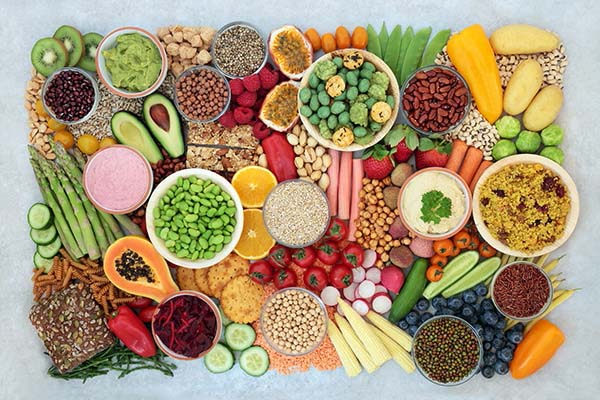What Athletes Say About Recovering on a Plant Based Beef Diet
What Athletes Say About Recovering on a Plant Based Beef Diet
Blog Article
Everything About Healthy Food: Benefits of Checking Out Plant Based Alternatives
The conversation bordering plant-based diet plans has actually obtained substantial focus in current years. Numerous individuals are exploring the potential wellness benefits, nutritional advantages, and ecological impacts connected with these nutritional options. As people become more aware of their food's influence on well-being and sustainability, questions develop concerning the usefulness of adopting such a way of living. What specific changes can one anticipate, and exactly how might these choices improve not only individual health and wellness however also the world's future?
Understanding Plant-Based Diets
Several people link plant-based diets mostly with vegetarianism or veganism, these diet plans can incorporate a broad range of consuming patterns that prioritize entire, minimally processed plant foods. Such diet regimens frequently consist of fruits, vegetables, entire grains, seeds, nuts, and beans, while getting rid of or restricting animal products. This flexibility enables people to tailor their dietary choices according to nutritional demands and personal choices. Some might embrace a mostly plant-based diet plan while still periodically consuming meat or dairy, commonly referred to as a flexitarian strategy. The emphasis remains on incorporating more plant foods, which can lead to a varied variety of flavors and meals. Understanding these numerous interpretations of plant-based eating is necessary for appreciating its access and allure in contemporary food culture.
Health And Wellness Advantages of Plant-Based Foods
The health and wellness advantages of plant-based foods are significant, using a nutrient density advantage that sustains overall wellness. Research study shows that these foods can enhance heart wellness and play a vital function in efficient weight monitoring. By integrating much more plant-based choices, people might improve their nutritional choices and promote long-term health.
Nutrient Thickness Benefit
Nutrient thickness plays an important function in the health and wellness advantages of plant-based foods, making them an engaging selection for those looking for a well balanced diet. Plant-based foods, such as fruits, vegetables, legumes, nuts, and whole grains, are usually rich in important vitamins, minerals, and antioxidants while being reduced in calories. This high nutrient density permits individuals to eat less calories while still meeting their nutritional requirements. Additionally, these foods are packed with dietary fiber, advertising digestive health and assisting in weight administration. By including nutrient-dense plant-based choices, consumers can boost their general health, support their body immune systems, and minimize the risk of chronic conditions. Eventually, the nutrient density of plant-based foods underscores their importance in a health-conscious way of living.
Heart Health And Wellness Improvement

Weight Administration Support
Along with promoting heart wellness, a plant-based diet plan can considerably assist in weight monitoring. This nutritional technique highlights entire foods such as fruits, vegetables, legumes, nuts, and whole grains, which are typically lower in calories and greater in fiber compared to animal-based items. The high fiber content helps raise satiety, reducing general calorie consumption. Plant-based diet regimens are commonly abundant in vital nutrients while low in unhealthy fats, making it easier to maintain a healthy and balanced weight. Study shows that people that embrace a plant-based lifestyle tend to have lower body mass indexes (BMIs) web link and experience more successful fat burning compared to those who eat meat-heavy diet regimens. Consequently, welcoming plant-based choices is a critical selection for reliable weight management
Nutritional Worth of Plant-Based Ingredients
Plant-based components are rich in vital nutrients, providing a varied selection of vitamins, minerals, and anti-oxidants that add to total health and wellness. A comparison of healthy protein resources reveals that while pet items are usually seen as premium, numerous plant-based options provide appropriate healthy protein and other useful compounds. Understanding the nutritional value of these ingredients can aid individuals make educated dietary choices.
Essential Nutrients in Plants
Nutrient-rich ingredients found in plants provide a diverse range of essential vitamins and minerals that contribute greatly to general health. These active ingredients are abundant in vitamins A, C, and K, which sustain immune function, vision, and blood clot, respectively. On top of that, plants give vital minerals such as calcium, potassium, and magnesium, critical for heart health and wellness, muscle function, and bone stamina. The visibility of fiber in plant-based foods help digestion and promotes a healthy intestine microbiome. Antioxidants, found perfectly in fruits and vegetables, assistance fight oxidative anxiety and minimize inflammation. Numerous plant foods are reduced in calories yet high in nutrients, making them an outstanding selection for those looking for to preserve a healthy and balanced weight while making sure ideal nutrient intake.

Comparing Protein Sources
Healthy protein resources vary significantly in their dietary profiles, with plant-based ingredients offering one-of-a-kind benefits. Unlike pet healthy proteins, which typically include saturated fats and cholesterol, plant proteins have a tendency to be lower in these unhealthy parts. Legumes, nuts, seeds, and whole grains are abundant in necessary amino acids, fiber, vitamins, and minerals. Lentils give high protein web content alongside substantial iron and folate, while quinoa is a complete healthy protein, providing all 9 crucial amino acids. Furthermore, plant-based proteins are usually gone along with by antioxidants and phytochemicals that sustain overall wellness. The shift to plant-based protein sources not only boosts nutritional consumption however also aligns with lasting dietary methods, decreasing environmental effect and advertising long-lasting wellness benefits.
Ecological Impact of Plant-Based Consuming
As awareness of climate adjustment grows, several individuals are checking out lasting dietary options that can considerably lessen their environmental impact. click resources Plant-based eating has actually become a considerable factor to minimizing greenhouse gas discharges, which are mainly related to animals production. The growing of fruits, grains, vegetables, and vegetables normally requires fewer resources, such as water and land, contrasted to animal farming. In addition, plant-based diet plans can bring about decreased deforestation, as less land is required for grazing livestock or growing animal feed. By changing in the direction of plant-based alternatives, consumers can support biodiversity and advertise healthier communities. On the whole, welcoming plant-based eating not only benefits personal health and wellness however also represents an important step towards ecological sustainability and preservation initiatives.
Conquering Common Misconceptions
While several people acknowledge the advantages of a plant-based diet plan, a number of misconceptions frequently deter them from completely welcoming this lifestyle. An usual idea is that plant-based diet regimens lack sufficient healthy protein; nevertheless, many plant sources, such as legumes, nuts, and tofu, provide sufficient healthy protein. In addition, some assume that this diet is expensive, when actually, staples like beans, rice, and seasonal veggies can be quite budget-friendly. One more misconception is that plant-based consuming is overly restrictive, whereas it in fact offers a varied selection of flavors and foods. Ultimately, numerous fret that a plant-based diet plan may bring about shortages, yet with proper preparation, people can obtain all essential nutrients, consisting of minerals and vitamins, while enjoying a wide array of delicious dishes.
Tips for Transitioning to a Plant-Based Way of life
Making the change to a plant-based lifestyle can be an improving experience, though it typically requires some assistance to navigate the first modifications. Initially, individuals are urged to start slowly, including more fruits, veggies, beans, and entire grains right into their dishes while lowering meat and dairy products usage. Meal planning is vital; preparing a weekly menu can assist reduce the adjustment and prevent last-minute undesirable options. Checking out new recipes and cooking techniques can also enhance the experience and preserve excitement about plant-based consuming. Furthermore, joining support system or communities can give inspiration and share important suggestions. Remaining educated regarding nutrition warranties well balanced meals, stopping shortages while promoting a healthy, gratifying plant-based way of life.

Delicious Plant-Based Meal Concepts
Exploring scrumptious plant-based dish concepts can motivate individuals to accept a much more nutritious diet. One prominent alternative is a passionate quinoa salad, featuring cherry tomatoes, cucumber, and a tangy lemon-tahini dressing. Another favorite is a full-flavored lentil stew, packed with carrots, celery, and aromatic natural herbs, ideal for a calming dinner. For morning meal, overnight oats made with almond milk, chia seeds, and topped with fresh berries supply a nourishing start to the day. Additionally, a vivid veggie stir-fry with tofu and a range of vivid veggies can be a fast yet satisfying dish. Finally, velvety avocado toast on whole-grain bread, sprinkled with flavors and seeds, uses a simple yet tasty treat. These dishes display the selection and richness of plant-based consuming.

Frequently Asked Questions
Can a Plant-Based Diet Plan Provide Sufficient Protein?
The concern of whether a plant-based diet plan can give sufficient healthy protein is usual. Numerous resources, consisting of legumes, nuts, seeds, and entire grains, can fulfill healthy protein requires efficiently, sustaining a well balanced and nutritious diet plan for people.
Are Plant-Based Diets Ideal for Children?
The suitability of plant-based diets for youngsters relies on mindful planning. Ample nutrients must be guaranteed, including vitamins, healthy proteins, and minerals. With proper assistance, such diet plans can support healthy growth and growth in kids.
Exactly how Do I Eat in restaurants on a Plant-Based Diet regimen?
Eating out on a plant-based diet plan entails looking for restaurants with diverse food selections, requesting for alterations, and exploring vegan-friendly alternatives. Planning ahead and interacting nutritional choices can enhance the dining experience while maintaining dietary options.
What Prevail Allergens in Plant-Based Foods?
Common allergens in plant-based foods consist of soy, gluten, nuts, and seeds - Plant Based Chicken. People complying with a plant-based diet must understand these irritants and review tags thoroughly to prevent damaging reactions and guarantee risk-free more information intake
Can Plant-Based Diets Assist With Weight Management?
Study suggests that adopting a plant-based diet regimen might assist in weight-loss because of its commonly reduced calorie thickness and greater fiber content. This mix can enhance satiation, aiding people handle their calorie intake efficiently. Numerous people associate plant-based diets mainly with vegetarianism or veganism, these diet plans can include a broad range of eating patterns that focus on entire, minimally refined plant foods. Nutrient density plays a necessary function in the health and wellness advantages of plant-based foods, making them a compelling choice for those seeking a well balanced diet plan. Plant-based diet plans have been revealed to considerably enhance heart health and wellness, as they typically include elements that sustain cardio function. In enhancement to advertising heart health and wellness, a plant-based diet regimen can substantially assist in weight administration. A typical idea is that plant-based diet plans lack enough healthy protein; however, many plant resources, such as vegetables, nuts, and tofu, offer enough healthy protein.
Report this page